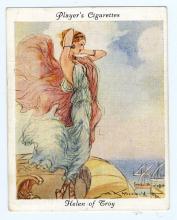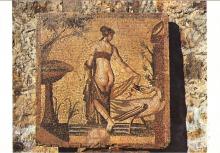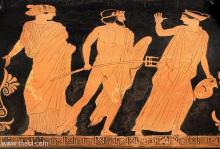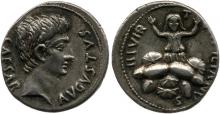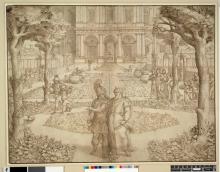Quālis ab Eurōtā Phrygiīs āvecta carīnīs
coniugibus bellī causa duōbus erat,
quālis erat Lēdē, quam plūmīs abditus albīs
callidus in falsā lūsit adulter ave,
quālis Amȳmōnē siccīs errāvit in Argīs,5
cum premeret summī verticis urna comās,
tālis erās: aquilamque in tē taurumque timēbam
et quicquid magnō dē Iove fēcit Amor.
nunc timor omnis abest animīque resānuit error,
nec faciēs oculōs iam capit ista meōs.10
cūr sim mūtātus quaeris? quia mūnera poscis:
haec tē nōn patitur causa placēre mihi.
dōnec erās simplex, animum cum corpore amāvī;
nunc mentis vitiō laesa figūra tua est.
et puer est et nūdus Amor, sine sordibus annōs15
et nūllās vestēs, ut sit apertus, habet.
quid puerum Veneris pretiō prōstāre iubētis?
quō pretium condat, nōn habet ille sinum.
nec Venus apta ferīs Veneris nec fīlius armīs:
nōn decet imbellēs aera merēre deōs.20
stat meretrix certō cuivīs mercābilis aere
et miserās iussō corpore quaerit opēs;
dēvovet imperium tamen haec lēnōnis avārī
et, quod vōs facitis sponte, coacta facit.
sūmite in exemplum pecudēs ratiōne carentēs:25
turpe erit, ingenium mītius esse ferīs.
nōn equa mūnus equum, nōn taurum vacca poposcit,
nōn ariēs placitam mūnere captat ovem.
sōla virō mulier spoliīs exultat adēmptīs,
sōla locat noctēs, sōla licenda venit30
et vendit, quod utrumque iuvat, quod uterque petēbat,
et pretium, quantī gaudeat ipsa, facit.
quae Venus ex aequō ventūra est grāta duōbus,
altera cūr illam vendit et alter emit?
cūr mihi sit damnō, tibi sit lucrōsa voluptās,35
quam sociō mōtū fēmina virque ferunt?
nec bene conductī vendunt periūria testēs
nec bene sēlectī iūdicis arca patet.
turpe reōs emptā miserōs dēfendere linguā,
quod faciat magnās, turpe tribūnal, opēs;40
turpe torī reditū cēnsūs augēre paternōs
et faciem lucrō prōstituisse suam.
grātia prō rēbus meritō dēbētur inēmptīs;
prō male conductō grātia nūlla torō.
omnia conductor solvit mercēde solūtā;45
nōn manet officiō dēbitor ille tuō.
parcite, formōsae, pretium prō nocte paciscī:
nōn habet ēventūs sordida praeda bonōs.
nōn fuit armillās tantī pepigisse Sabīnās
ut premerent sacrae virginis arma caput;50
ē quibus exierat, trāiēcit viscera ferrō
fīlius, et poenae causa monīle fuit.
nec tamen indignum est ā dīvite praemia poscī:
mūnera poscentī quod dare possit habet;
carpite dē plēnīs pendentēs vītibus ūvās,55
praebeat Alcinoī pōma benignus ager.
officium pauper numeret studiumque fidemque;
quod quis habet, dominae cōnferat omne suae.
est quoque carminibus meritās celebrāre puellās
dōs mea: quam voluī, nōta fit arte meā.60
scindentur vestēs, gemmae frangentur et aurum;
carmina quam tribuent, fāma perennis erit.
nec dare, sed pretium poscī dēdignor et ōdī;
quod nego poscentī, dēsine velle, dabō.
notes
1.10: Love for Sale
Three heroines are cited because they are spectacularly beautiful: Helen of Troy, Leda, and Amymone (lines 1–6). But although the poet had been possessive about his gorgeous girlfriend (lines 7–8), that’s all over: he has now decided that she’s not attractive at all (lines 9–10). The reason for this change, we learn, is that the girl has asked for presents (munera, line 11). [full essay]
1–2: Quālis … erat: introduces a series of three comparisons between beautiful heroines of mythology and the poet’s beloved, rounded off by tālis erās in line 7: "Just as x was ... such (i.e., so beautiful) were you." Eurota > Eurōtās, -ae f. the Eurotas river, the river of Sparta. Phrygiīs > Phrygius, -a, -um "Phrygian," a territory in Asia Minor, hence "Trojan." āvecta: "she who was carried away," a reference to Helen. coniugibus ... duōbus: "for her two spouses," Menelaus and Paris. Helen's enduring status as an icon a feminine beauty has endured from Homer through Ovid and into more recent popular culture, as can be see in a cigarette card from the 1920s, from a series representing "Famous Beauties."
3–4: Lēdē: alternative form of Lēda. Jupiter seduced her in the form of a swan (in falsā ... ave). callidus … adulter: Jupiter, renowned for his many sexual dalliances with mortals. in: "in the guise of" + abl. lūsit: here lūdō means primarily "deceive," but it retains its erotic meaning of "sport amorously" and "be promiscuous" (see on 1.8.43 above). A 3rd century AD mosaic from Cyrpus shows Leda, disrobing in a marshy setting, looking over her shoulder at the interested swan.
5–6: Amȳmōnē > Amȳmōnē, -ēs, f. Amymone was one of the fifty daughters of Danaus, king of Argos. When Danaus emigrated with his family to Argos, Poseidon had blighted the city with drought. Danaus sent his daughters to look for water, but Amymone was attacked by a satyr. The satyr was driven off by Poseidon, who both successfully seduced Amymone and produced a spring. premeret: premō can mean "be on top of, cover"; Amymone was carrying the jar on her head. tālis erās: the narrator is addressing his puella and placing her in the same category with these three women of myth. A Greek vase of the 5th century BC now at the Boston Museum of Fine Arts shows Amymone, decorously dressed and holding her water-jug, fleeing in panic before Poseidon, who menaces her with his trident. One of her Danaid sisters escapes to the left.
7–8: aquilamque: Jupiter took the form of an eagle to abduct Ganymede. in tē: "for you"; in + accusative can indicate the person towards whom feelings are directed. taurumque: Jupiter took the form of a bull to abduct Europa. quicquid: "whatever," i.e., whatever other shape, like that of eagle or bull, adopted by Jupiter in pursuit of his love affairs. magnō dē Iove: "out of great Jupiter"; dē here is perhaps used humorously to indicate the material from which a thing is made.
9–10: timor omnis: the fear that she too, like Helen, Leda and Amymone, would be abducted. faciēs ... ista: either "that well-known face of yours" or "that well-known beauty"; in either case ista ("that well-known") indicates contempt. capit: "captivates / captures."
11–12: Read this line aloud. Note the slow, heavy pace of the spondees that make up the question, then the light rapidity of the dactyls that form the response.
13–14: simplex: "artless, naïve, lacking guile."
15–16: nūdus: "naked, exposed" and "without material possessions." sordibus > sordēs, sordis f. usually "filth," but here "greed." ut sit apertus: "so that he is open in his ways" (Barsby); result clause (AG §537).
17–18: puerum Veneris: = fīlium Veneris, i.e. Cupid. pretiō: ablative of price (AG §416). prōstāre: "to offer oneself for sale," used specifically of prostitutes. iubētis: the plural indicates that the poet is now addressing a more general audience, of women in particular. quō: "where." condat > condō, condere, condidī, conditum "to put away." sinum: a fold in clothing used as a pocket. Cupid doesn’t have a sinum because he is nūdus.
19–20: apta: governs not only Venus but also fīlius. An adjective modifying two or more nouns is usually plural, but it can be singular, and agree in gender with the nearest of the nouns (AG §286); supply est. ferīs: construe with armīs. aera merēre: "serve for money" or perhaps "serve as mercenaries"; there is an untranslatable pun here, since mereō is used for the activities of prostitutes, and (esp. with stipendium) can mean simply "serve in the army."
21–22: certō … aere: "at a set charge" (ablative of price, AG §416). cuivīs: "by anyone"; dative of agent with mercābilis (AG §375). mercābilis: "purchasable" (rare); she can be bought. iussō corpore: that is, by being forced to sell her body; ablative absolute (AG §420).
23–24: dēvovet ... avarī: "even so she (haec, the prostitute) curses the power of the greedy pimp." facitis sponte, coacta facit: The contrast between willing puellae and the unwilling meretrix is underscored by the reversed order of words (chiasmus).
25–26: in exemplum: in + acc., "for the sake of." ratiōne: ablative of separation with carentēs (AG §400). turpe: "disgraceful." mītius: comparative degree adjective modifying ingenium, "a gentler nature"; supply quam vōbīs. ferīs: dative of possession (AG §373). "It will be disgraceful for beasts to have a nature more gentle (than you)."
27–28: poposcit: gnomic perfect (AG §475); note that poscō takes a double accusative ("ask X for Y"). placitam: "(erotically) pleasing to him." captat: "woos, courts."
29–30: ademptīs > adimō, adimere, adēmī, ademptum "to remove"; take with virō = dative of disadvantage, "taken away from a man." locat noctēs: supply sē, "hires herself out for the night." licenda: > liceor, licērī, "to bid for"; the gerundive form indicates purpose: "comes to be bid upon."
31–32: quod: "that which." pretium ... facit: "sets her fee." quantī gaudeat ipsa: "for as much as she herself would like." quantī is genitive to express indefinite value (AG §417). gaudeat is potential subjunctive (AG §447.3).
33–34: Venus: here not the goddess, but sex itself. Note the word play on Venus … ventūra … / … vendit. ex aequō: "equally, to an equal extent." ventūra est: for the future active periphrastic, constructed from the future active participle and forms of sum, see AG §195. illam: i.e., Venerem.
35–36: damnō: "(a cause of) financial loss"; dative of purpose or end, also called the double dative construction in combination with the dative of reference (mihi); it indicates that for which a thing serves or what it accomplishes (AG §382). lucrōsa > lucrōsus, -a, -um "lucrative, profitable" (rare). Note the antithesis in cūr mihi sit damnō, tibi sit lucrōsa voluptās. sociō: > socius, -a, -um, "shared, common," but the legal and political meanings of socius, -iī ("partner, ally") are also relevant; sociō motū = sexual intercourse.
37–38: nec bene … / nec bene: = male (litotes), "unethically"; other forms of unethical behavior are underscored by the anaphora. conductī: "hired." sēlectī iūdicis: Roman trials, both civil and criminal, were decided by judges (iūdicēs) chosen (selectī) by the praetor urbānus for inclusion on a list of potential jurors. arca > arca, -ae f. "chest," especially "money box." Arca patet, i.e., to receive bribes.
39–40: turpe: understand est. emptā ... linguā: ablative absolute (AG §420). It was illegal for lawyers to receive payment for their services; they were supposed to speak as a personal favor when, in theory, they were convinced of the justice of the litigant’s cause. dēfendere: subjective infinitive. quod faciat magnās, turpe tribūnal, opēs = tribūnal turpe est, quod faciat magnās opēs. > tribūnal, -ālis, n. "tribunal," the platform on which a magistrate sat while judging cases.
41–42: reditū > reditus, -ūs, m. "revenue, return," here of money made in prostitution. faciem: a part representing the whole. lucrō: "profit"; ablative of price (AG §416). prostituisse: either a gnomic perfect (AG §475) or an aoristic use of the perfect (indicating that the action has occurred but making no statement about when, AG §473). The poets often use perfect forms with this aoristic meaning as metrically convenient substitutes for the present tense.
43–44: meritō: "with good cause, deservedly"; adverb. male: "with base intent," i.e., in the exchange of sex for money. grātia nūlla: understand dēbētur.
45–46: conductor: the "john." omnia solvit: solvit is perfect tense, "has dissolved all obligations," i.e., there are no strings attached. mercēde solūtā: ablative absolute (AG §420); "after the payment has been made in full." nōn manet officiō dēbitor ille tuō = ille nōn manet dēbitor officiō tuō. Officiō tuō is probably dative, "under any obligation to you."
47–48: parcite = nōlīte.
49–50: nōn fuit armillās tantī pepigisse Sabīnās = nōn fuit tantī pepigisse armillās Sabīnās. The reference is to Tarpeia, the Vestal Virgin who betrayed Rome to the Sabines because they promised her the golden bracelets they wore on their arms. They fulfilled their promise by crushing her with their shields (also worn on the arm). nōn fuit tantī: "it wasn’t of much value," i.e. "it wasn’t worth it." Certain adjectives, including tantus, are used in the genitive to express indefinite value (AG §417). ut: "with only this result"; for the use of a result clause in a restrictive sense, see AG §537b. A Roman silver denarius minted right around the time the Amores were written shows Tarpeia buried in shields. The story Tarpeia as Livy tells it (1.11) is an object lesson to those who would betray their country for gold, so its appearance on coinage is perhaps more than merely ornamental. Ovid, as usual, distorts the lesson for his own humorous purposes.
51–52: ē quibus exierat, trāiecit viscera ferrō / fīlius = fīlius ferrō trāiēcit viscera ē quibus exierat. Alcmaeon killed his mother Eriphyle, to whom Polynices gave a golden necklace in return for persuading her husband Amphiaraus to join the expedition against Thebes, where he was killed. monīle: emphatic: "and a necklace was the cause."
53–54: mūnera poscentī quod dare possit habet = habet quod possit dare poscentī mūnera. The subject is the dīves mentioned in line 53. The poet casually reveals a cynicism which undercuts what the poet has been saying about women’s greed.
55–56: praebeat: hortatory subjunctive. Alcinoī > Alcinous, -ī, m. Alcinous was king of the Phaeacians. His rich orchards welcomed Odysseus after his escape from Calypso and shipwreck. In a drawing Giovanni Battista Castello (1524-1567) re-envisioned the proverbially rich island estate of Alcinous as a renaissance garden and villa, with Alcinous showing Odysseus around like a wealthy Italian patron.
57–58: pauper numeret: "let the poor man pay" his mistress with (+ acc.). quod quis haberet: "that which each man possesses." quis is an indefinite pronoun, which can be used in generalizations.
59–60: est quoque ... dōs mea: "it is my gift (literally ‘dowry’) also." quam = ea quam. voluī: understand celebrāre.
61–62: carmina quam tribuent, fāma perennis erit = fāma quam carmina tribuent perennis erit. The emphatic word is placed first.
63–64: dēdignor > dēdignor, -ārī, -ātus, "to refuse scornfully" (+ infinitive). dēsine velle = sī desieris velle.
vocabulary
Eurōtas -ae m.: the Eurotas, the river of Sparta
Phrygius -a -um: Phrygian, a territory in Asia minor; Trojan
āvehō -vehere -vehexī -vectum: carry off, bear away
carīna -ae f.: keel; ship
Lēdē -ēs f.: Leda
plūma -ae f.: feather, down
abdō -dere -didī -ditum: put away, withdraw; conceal, cover
callidus -a -um: clever, crafty, cunning
lūdō lūdere lūsī lūsum: deceive; sport amorously, be promiscuous
adulter -erī m.: adulterer
Amȳmōnē -ēs f.: Amymone, one of the fifty daughters of Danaus
siccus -a -um: dry, dessicated
Argī -ōrum m. pl.: Argos (a city in the Peloponnese)5
summus -a -um: highest, uppermost; final
vertex -icis m.: a whirl, whirlwind; summit, top of the head
urna -ae f.: urn, pitcher
aquila -ae f.: eagle
taurus -ī m.: bull
Iuppiter Iovis m.: Jupiter
resānescō -sānescere -sānuī: be healed
simplex -icis: artless, naïve, lacking guile13
figura -ae f.: form, figure
sordēs -is f.: filth; greed15
apertus -a -um: open, exposed; free
Venus -eris f.: Venus
prostō -stāre -stitī -stitum: offer oneself for sale
imbellis -e: unwarlike; peaceful20
meretrix -icis f.: harlot, courtesan
mercābilis -e: purchasable
dēvoveō -vovēre -vōvī -vōtum: devote, consecrate; curse, execrate
lēnō -ōnis m.: a procurer, pimp
avārus -a -um: greedy, miserly
sponte: (abl. sg. as adv.) naturally, by nature; voluntarily
pecus -dis f.: beast, animal25
mītis -e: mild, soft
equa -ae f.: mare
vacca -ae f.: cow
ariēs -etis m.: ram
captō -āre: woo, court
ovis -is n.: sheep
spolium -ī n.: plunder, spoils
exultō -āre: exult, rejoice, triumph
adimō -imere -ēmī -emptum: remove
locō -āre: place, position, set; hire out
liceor licērī licitus: bid for30
vendō -dere -didī -ditum: sell, vend
emō emere ēmī emptum: buy, purchase
lucrōsus -a -um: lucrative, profitable35
mōtus -ūs m.: motion, movement
condūcō -dūcere -dūxī -ductum: lead together, unite; hire; bribe
periūrium (pēiūrium) -ī n.: false oath, lie
sēligō -ligere -lēgī -lectum: choose, select
arca -ae f.: chest; money box
tribūnal -ālis n.: tribunal40
torus -ī m.: bed, couch
reditus -ūs m.: revenue, return
census -ūs m.: census; wealth
paternus -a -um: of a father, paternal; ancestral
lucrum -ī n.: profit
prostituō -stituere -stituī -stitūtum: prostitute
meritus -a -um: deserving, meriting
inemptus -a -um: unbought
conductor -ōris m.: contractor
mercēs -ēdis f.: hire, pay, wages45
dēbitor -ōris m.: debtor
formōsus -a -um: shapely, beautiful
paciscor pacisci pactus sum: negotiate, seek through bargaining
ēventus -ūs m.: consequence, outcome, event, occurrence
sordidus -a -um: filthy, foul, tarnished by greed
armilla -ae f.: bracelet
pangō pangere pepigī pactum: fasten, fix; settle for, agree upon, contract for
Sabīnus -a -um: Sabine
trāiciō -icere -iēcī -iectum: throw across; pierce, pass through51
viscus -eris n.: internal organs; womb
monīle -is n.: necklace
indignus -a -um: unworthy, beneath one's dignity
carpō carpere carpsī carptum: pluck
vītis -is f.: vine, grapevine
ūva -ae f.: grape55
Alcinous -ī m.: Alcinous, king of the Phaecians
pōmum -ī n.: fruit tree, fruit
benignus -a -um: kind, generous
numerō -āre: count; count out as payment
dōs dōtis f.: gift, endowment; dowry60
scindō scindere scidī scissum: cut, rend, tear asunder
gemma -ae f.: jewel, gem
tribuō tribuere tribuī tribūtum: grant, bestow, award
perennis -e: perennial
dēdignor -ārī: refuse scornfully

